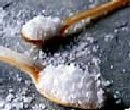Risks of slashing sodium levels in cheese could outweigh benefits, US researcher

Dr. John Lucey, director of the Center for Dairy Research at the University of Wisconsin-Madison (CDR) told DairyReporter.com that US government agencies and regulators were pushing industry to cut sodium levels by up to 25%, but that cutting sodium in cheese was a “tricky business from a research standpoint with products such as cheddar – a lot of product adjustments have to be made to dial back in the same kind of quality”.
A February report from the Centers for Disease Control and Prevention (CDC) said that 90% of US adults consumed too much sodium daily, contributing to a $273bn (€206bn) annual healthcare bill, and noted Kraft Foods’ commitment to cut sodium levels by 10% on average over two years.
But sodium from dairy sources only comprised 8% of total US dietary intake, Lucey said, so even a 15% reduction in dairy-related sodium levels would only have a 1% effect on total dietary sodium intake.
He added: “Sodium in a product like cheese has developed over hundreds of years as a key nutrient and a material in there that protects from pathogen growth and higher water activity, while it is also important in terms of flavour.
“It’s an integral part of the product. So in regard to regulatory pressure forcing people to produce low sodium cheeses (a very big change for varieties like cheddar), what will the product look like? Probably not like cheddar, and it won’t taste like cheddar, and then perhaps consumers won’t buy it.
“I don’t know how that helps anybody, and there’s no evidence of great consumer demand for low sodium cheese, while salt is also a key hurdle for bacterial growth – so potential for sickness by cutting it out could easily outweigh positive effects of reducing sodium in the diet.”
Danger of poisoning
At the CDR’s annual Industry Team Research Forum on December 1, Lucey said he took part in a roundtable discussion, which included a representative from large-scale US producer Saputo Cheese, so we asked him how worried industry players were about the costs (both in fiscal and quality terms) of sodium cuts?
“Of course, a condition such as hypertension is a major health concern, but people who want to consume low sodium cheeses can buy Swiss cheese (Emmental) or Mozzarella, and should be advised from a medical standpoint to do this,” Lucey said.
“From a food science perspective these are well-established safe cheeses, and there’s no risk with these products of poisoning lots of people. But if industry makes a low sodium product that people get sick from then brands or companies could be destroyed. People’s livelihoods could be at stake.
He added: “And for people who want to eat, say, Feta and Blue Cheese – are they not going to be able to have these products? If we force everyone to change, does that mean the quality of such products will suffer, because sodium is so integral to development of flavour of such products.”
“Companies are thinking about food safety risks, taste problems and the risk of consumers running away from them, due to perceptions of adverse quality, and going elsewhere.”
While there was no legal obligation to cut sodium levels, Lucey said, “there are discussions at some levels about whether reductions would no longer be voluntary, where we’re seeing pressure at the moment is in the areas where the government is setting nutritional guidelines”.
The US government was heavily involved (via Federal funding) in buying foods and setting contracts regarding the provision of foods in schools, Lucey said, and thus set expectations and regulations around certain nutrients. “That’s where the most immediate pressure is coming from, in terms of fat, salt, etc.,” he added.
Worthwhile health intervention?
But Lucey cited a Cochrane Review of salt and health (Taylor et al. 2011), which assessed international calls for dietary salt reduction as a major intervention for prevention and control of non-communicable diseases, and said that people should strive to reduce salt in the diet.
“The review looked at many interventions that have reduced sodium and salt, and raised evidence that reducing salt can lead to some changes in blood pressure. But it said there was no conclusive evidence to suggest that this had a long-term health benefit," Lucey said.
“So they’re saying that, as regards basing policy decisions on cutting sodium by 20% in the diet and having amazing health benefits – the evidence isn’t there yet. This runs counter to current public perceptions, and those of many other interest groups out there.”
Furthermore, there was scant evidence that potassium chloride or other synthetic compounds used as salt replacers were necessarily better, Lucey added. “We don’t know enough about them, nor do they have as long a history of large, widespread consumption."
He said: “There’s also the practical problem of an off-flavour and chemical taste that limits their [salt replacers'] use, and beyond this we don’t have enough information about taking out sodium and replacing it with some other large-scale intervention.
“Sodium chloride is also vital in many bodily functions, so that’s another concern. I don’t have a problem with pressure groups having influence, if the science is there. But take the Cochrane Review’s conclusions, for instance.”















